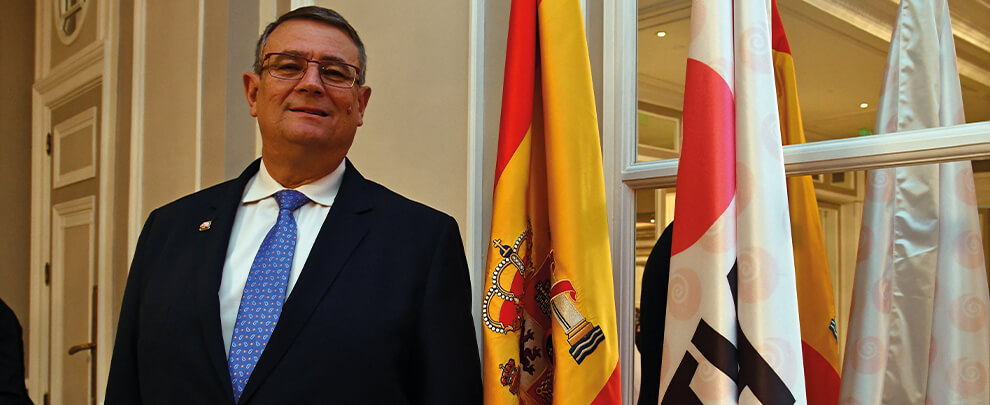Blog
Blog

Manuel García: "We lead the way, and other countries follow"
16th January 2024 - News
Spanish pork is one of the most valued national products outside our borders. It is currently present in more than 100 markets. Despite the current situation, the value of exports of this food has continued to grow during 2023, thanks to the competitiveness and professionalism of the Spanish pork sector. We discussed these issues with Manuel García, president of Interporc, the Interprofessional Association of White Layer Pigs.
Can you explain how Spanish pork is perceived outside our borders?
Spain is perceived as a world leader, with a cutting-edge sector from a technological point of view, with a production model that is the strictest in the world and as a country that leads the way in matters such as animal welfare. All this makes us a benchmark in product quality. In addition, our meat and processed products are constantly improving thanks to the research carried out by our companies and the constant implementation of technical improvements in the processes. In the white-coat pork sector in Spain, we lead the way, and other countries are following us.
How has the perception of meat evolved in the last decade?
The most significant thing about the perception of meat is the proliferation of groups that, out of economic interest or simply ignorance of the reality of meat, contribute to and encourage the formation of a distorted image of the truth. This truth is well known to the 415,000 people in the meat sector, each in their own place. Farmers know they work to the highest animal welfare standards; veterinarians have the best biosecurity conditions in the world; and researchers know that our products' nutritional quality and food safety are a global benchmark. That is the truth that we at INTERPORC put before that, as I said, a false narrative that answers to the ignorance of this reality and to the economic interests of groups that compete to introduce the new products they manufacture into consumers' diets and that, curiously, often take advantage of the meat denominations that they revile so much.
What fears are there in the pork sector regarding this issue?
Fear, none. You cannot be afraid when scientific truth aids you. Abide by the law, and do your work honestly and with absolute respect for animal welfare. What you have is pride. When we hear some stories about our activity in the media or on social networks, we look at each other perplexed because they describe a parallel reality that we do not recognise in our daily lives. But we are country people, good people. Our ancestors taught us that if you go with the truth before you, sooner or later, it will be what shapes your image in the eyes of others.

Image of the promotion of pork in a television program. Photo: INTERPORC.
Currently, national pork is present in more than 100 markets. Can you take stock of how Spanish pork exports have been this year?
The pork sector is no stranger to the context still marked by inflation. Thus, in the first half of this year, the industry reduced meat production by 5.01% and the volume of exports by 6.71%. On the positive side, there has been a significant increase in the value of exports (up 15.49% compared to the first half of 2022). Growing in value is very positive, demonstrating strength in the products with the highest added value and the most demanding markets globally.
Spanish pork has found China to be one of its priority destinations. Why?
Like all countries, the Chinese authorities want to feed their population with the best quality meat and the maximum food safety guarantees. In addition, they want to deal with serious companies that meet the agreements and deadlines set. All this is what they find in the white-coat pork sector in Spain.
What would you say are the keys to the success of Spanish pork?
Product quality and earnestness in business relationships. That's what we offer, and it's certainly the key to our success in every country we export to.
What actions does Interporc carry out to promote our pork?
We constantly develop communication campaigns in Spain and abroad. In them, we show the sector's progress in sustainability, animal welfare, circular economy, etc. And, of course, the nutritional benefits of pork. In Spain, recent highlights are our sponsorships of the Queens League and TVE's "El Grand Prix" program. Regarding our foreign activity, we have carried out actions in China, Chile, Vietnam, the Philippines, Japan and Korea, to name a few markets where we have been most active recently. Over the next year, we will maintain the intensity of our advertising in foreign markets. We will be at trade fairs, carry out actions in countries of interest, and accompany the sector in everything it needs to facilitate its development abroad.
What challenges must the national pork sector face to maintain this leadership position?
The main challenges of the sector have been defined in the Strategic Plan for the pork sector, in which we address the future challenges that arise: maintaining and developing the high productive potential of the industry, its competitiveness and its position of leadership and prestige in the world pig markets, as well as its capacity to provide high-quality proteins and maximum affordability; adapt to the objectives and regulations promoted by the European Union in environmental matters, renewable energies, water footprint and animal welfare and biosecurity, with particular attention to the eradication of the impact of ASF; maintain an adequate and effective balance in the sectoral food chain and a competitive degree of diversification, differentiation and adjustment between supply and demand; defend and enhance the image, reputation and transparency of the Spanish pork sector; and, finally, to strengthen the union, structuring and negotiating strength of the Spanish pork sector in all kinds of areas, and especially before the European Commission.






